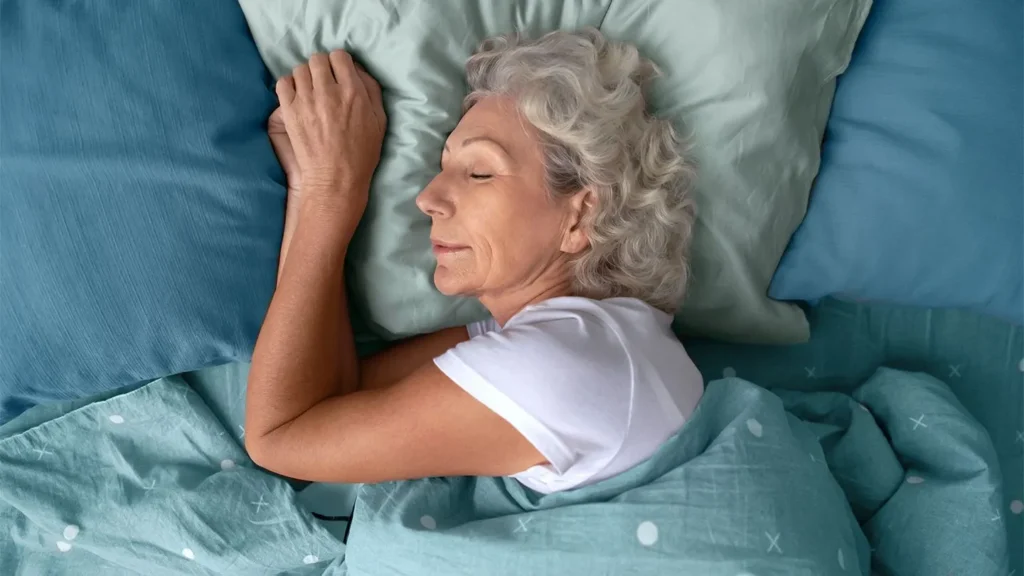Menopause is a natural stage in a woman’s life that marks the end of her reproductive years. It typically occurs in women in their late 40s or early 50s, although the exact age can vary. Menopause is characterized by a decrease in the production of estrogen and progesterone, which can lead to a variety of physical and emotional symptoms, including hot flashes, night sweats, mood swings, and sleep disturbances.
One of the most common and disruptive symptoms of menopause is sleep disturbances. Many women going through menopause experience difficulty falling asleep, staying asleep, or waking up too early. These sleep disturbances can have a negative impact on a woman’s physical and emotional well-being, making it even more important to prioritize quality sleep during this time of transition.
In this article, we will explore the importance of quality sleep during menopause, its impact on overall health, and provide tips for better rest. We will also address common questions and concerns related to sleep during menopause.
Importance of Quality Sleep During Menopause
Quality sleep is essential for overall health and well-being, but it becomes even more crucial during menopause. Sleep plays a vital role in hormone regulation, immune function, cognitive function, and emotional well-being. When sleep is disrupted, it can have a negative impact on all of these areas, leading to a range of physical and emotional symptoms.
During menopause, the decrease in estrogen and progesterone levels can disrupt the body’s natural sleep-wake cycle, making it more difficult to fall asleep and stay asleep. This can lead to increased feelings of fatigue, irritability, and difficulty concentrating during the day. Sleep disturbances during menopause can also exacerbate other symptoms, such as hot flashes and mood swings, making it even more challenging to manage these changes.
In addition to the immediate effects of sleep disturbances, poor sleep during menopause has been associated with an increased risk of chronic health conditions, such as heart disease, diabetes, and obesity. Research has shown that women going through menopause are at a higher risk of developing these conditions, and poor sleep may be a contributing factor. By prioritizing quality sleep during menopause, women can help protect their long-term health and well-being.
Tips for Better Rest During Menopause
Fortunately, there are several strategies that women going through menopause can use to improve their sleep quality and better manage the symptoms of menopause. Here are some tips for better rest during this time of transition:
1. Establish a bedtime routine: Creating a bedtime routine can help signal to your body that it is time to wind down and prepare for sleep. This can include activities such as reading, meditating, or taking a warm bath before bed.
2. Create a sleep-friendly environment: Make sure your bedroom is conducive to sleep by keeping it dark, quiet, and cool. Invest in a comfortable mattress and pillows, and consider using white noise or earplugs to block out any disruptive sounds.
3. Manage stress: Stress can make it harder to fall asleep and stay asleep, so it is important to find ways to manage stress during menopause. This can include activities such as yoga, meditation, deep breathing exercises, or talking to a therapist.
4. Limit caffeine and alcohol: Both caffeine and alcohol can disrupt sleep, so it is important to limit your intake of these substances, especially in the hours leading up to bedtime.
5. Stay active: Regular exercise can help improve sleep quality and overall well-being during menopause. Aim for at least 30 minutes of moderate exercise most days of the week, but avoid vigorous exercise close to bedtime.
6. Talk to your healthcare provider: If you are experiencing severe sleep disturbances during menopause, it is important to talk to your healthcare provider. They can help identify any underlying issues that may be contributing to your sleep problems and recommend appropriate treatments.
FAQs About Sleep During Menopause
Q: Why do women experience sleep disturbances during menopause?
A: The decrease in estrogen and progesterone levels during menopause can disrupt the body’s natural sleep-wake cycle, making it more difficult to fall asleep and stay asleep.
Q: What are some common symptoms of poor sleep during menopause?
A: Common symptoms of poor sleep during menopause include difficulty falling asleep, staying asleep, or waking up too early. Other symptoms can include fatigue, irritability, and difficulty concentrating during the day.
Q: Can poor sleep during menopause lead to long-term health problems?
A: Yes, research has shown that poor sleep during menopause is associated with an increased risk of chronic health conditions, such as heart disease, diabetes, and obesity.
Q: What are some strategies for improving sleep quality during menopause?
A: Some strategies for improving sleep quality during menopause include establishing a bedtime routine, creating a sleep-friendly environment, managing stress, limiting caffeine and alcohol, staying active, and talking to your healthcare provider.
Q: When should I talk to my healthcare provider about my sleep disturbances during menopause?
A: If you are experiencing severe sleep disturbances during menopause that are impacting your daily life, it is important to talk to your healthcare provider. They can help identify any underlying issues and recommend appropriate treatments.
In conclusion, quality sleep is essential for overall health and well-being, especially during menopause. By prioritizing sleep and implementing strategies for better rest, women going through menopause can improve their physical and emotional well-being and reduce the risk of long-term health problems. If you are experiencing severe sleep disturbances during menopause, it is important to talk to your healthcare provider for guidance and support. By taking care of your sleep, you can better manage the symptoms of menopause and enjoy a healthier and more fulfilling life.
